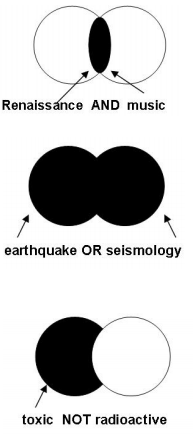Searching in databases
Databases are online collections of resources that you can search to find information. They may cover a particular subject area or cover a range of subjects.
Most databases:
- have a peer reviewed or scholarly material filter to ensure you get reliable, authoritative information
- offer advanced search features that allow you to focus your search.
You can search databases to find journal articles, but they may also contain other publication types such as books, theses, newspapers, videos and images.
Databases usually have a "Help" section with a detailed explanation of how to perform searches.
Focus your search in databases using these search tips:
4. Combine search terms (AND, OR, NOT)
Connectors (sometimes called Boolean operators) are used to combine search terms. There are three connectors: AND, OR, NOT.
They are useful to add when you are getting too few or too many results.

AND
AND placed between words means both words must appear in each reference. This will narrow your search.
For example, renaissance AND music will retrieve all references which contain both terms.
OR
OR placed between words means that either, or all, word/s may appear in each reference. This will broaden your search.
For example, earthquake OR seismology will retrieve all references with earthquake or seismology, as well as references with both terms.
NOT
NOT place between words means that the second word must not appear in any reference.
This will narrow your search.
For example, toxic NOT radioactive will retrieve all references with toxic, except references which include radioactive. Take care when you use the NOT connector – you may exclude useful references.